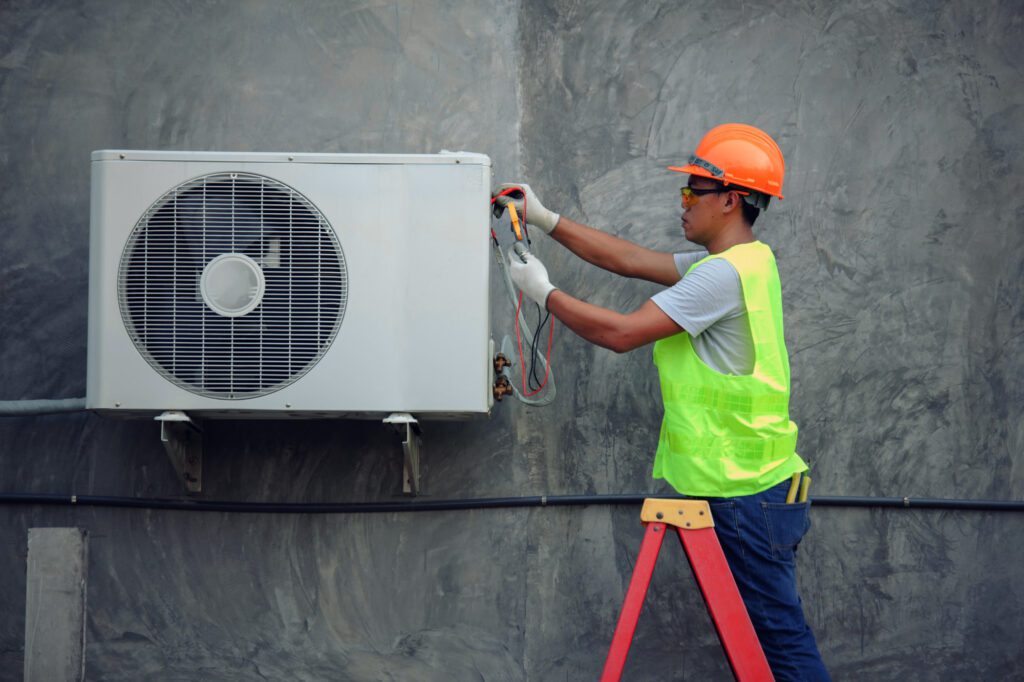What Types of HVAC Systems Are Available for Your Home?

Regardless of the season, HVAC systems rarely break down when it’s convenient. In the sweltering heat of summer, your AC can malfunction. A furnace will inevitably fail when temperatures plunge below zero.
COMPARE COSTSAre you prepared to install a new system?
Most homeowners aren’t, and it’s not always because of the financial investment. The average homeowner doesn’t have enough information about the different types of HVAC systems to make an educated decision.
In this guide, you’ll find an overview of HVAC systems available for your home. Take a minute and read through your options to better prepare you to choose the system best suited for your needs.
We’ll start with the most common type of residential system—the split HVAC system.
HVAC Split Systems
The most common HVAC system found in homes is the split system. Split systems have two main units:
Heating
Most heating systems operate on a furnace. The furnace is typically either gas-fueled or powered by electricity.
Depending on the home’s design, HVAC contractors install the furnace unit in a utility closet, basement, crawl space, attic, or garage.
If you live in a warm climate, you may have a heat pump. We’ll talk about heat pumps in a minute.
Cooling
The central air conditioner or AC is most often installed outside on a cement pad. You’ll see AC units installed on the roof in some parts of the country.
Split systems have different configurations. Home design and climate are two factors that determine system configuration.
COMPARE COSTSHow Does a Split System Work?
The outdoor AC unit and the furnace make up a forced-air system. This type of HVAC system relies on a blower fan and ductwork. The blower fan circulates air through the ductwork and out into the rooms in your home.

Forced air systems manage untreated (cold) air through absorption. Treated (warm) air gets pushed out into the environment.
What about heat pumps?
If you live in a warm climate, such as Arizona or some areas in the South, you may benefit from a heat pump split system. This system uses a heat pump and air handler as its main components.
The interesting thing about heat pumps is they don’t generate heat. Heat pumps absorb ambient heat and then circulate it to the ducts via an air handler.
One complaint about split systems is that they can circulate dust and allergens in the indoor air. Some homeowners say a split system circulates cooking odors. Even so, split systems are still popular due to their efficiency and cost-effectiveness.
Be aware that if your home doesn’t already have ductwork installed, adding it is an additional cost beyond the heating and cooling equipment cost.
Note: Ask your HVAC contractor about hybrid split systems. A hybrid system gives you the option to use either gas or electricity to heat your home. If you live in a climate with fluctuating temperatures during the winter, this system may be a good option.
Ductless HVAC Systems
Another popular HVAC system is the ductless or mini-split system. The design of mini-split HVAC systems allows them to work without ductwork. It’s an excellent cost-saving feature for homes without existing ductwork.
A mini-split system warms or cools a single room or several rooms, depending on the configuration.
If you install a single-zone ductless HVAC system, you’ll connect one indoor unit to an outdoor unit, which houses the compressor. This allows heating and cooling for one room only.
Multi-zone ductless HVAC systems give you more options because you can heat and cool in more than one room. In a multi-zone system, you’ll connect multiple indoor units to one outdoor unit.
Your HVAC installer will mount the indoor units on a wall. The outdoor unit sits either at ground level on a cement pad or on the home’s roof.
Mini-split systems are easier to install than split HVAC systems. Upfront, you may pay more for the equipment. Generally, you’ll pay less overall due to the lower energy costs associated with operating these HVAC systems.
COMPARE COSTSWhy Choose a Mini-Split HVAC System?
Ductless HVAC systems are ideal if you only need to heat or cool one room. Homeowners find them particularly useful in sunrooms and garages—rooms where they don’t spend much time.
One disadvantage of mini-split systems is they don’t work as effectively at heating. If you live in a colder climate, you’ll want to explore other options.
Also, if you live in an area where ductless HVAC systems aren’t as common, you could run into issues getting parts needed for maintaining your system.
If you’re considering a mini-split HVAC system, discuss the pros and cons with a qualified HVAC contractor.
Zone Control HVAC Systems
Are you interested in an HVAC system that allows you to choose which areas of your home you want to heat or cool? If so, then you’ll want to explore HVAC zoning.
Let’s look for a minute at a typical split HVAC system.
Split systems usually work with one centrally located thermostat. That one thermostat controls the temperature in the entire house. It doesn’t care whether the person in an upstairs bedroom prefers a chilly environment vs. the one working in the lower-level office, who likes a warmer room.
Zone HVAC systems allow you to set the temperature in different areas (not individual rooms) independently of each other.
Here’s how it works.
A zoned HVAC system relies on dampers installed in one of two locations:
- In the ductwork
- At the air vents
The dampers open and close mechanically. This allows air to circulate only in the area—or zone—where it’s needed. You adjust the temperature in each location using the thermostat dedicated to that zone.
Zoned HVAC systems offer several benefits, including:
- Energy savings
- Reduced repairs
- Extended service life
A significant benefit of zone-controlled systems is that they help reduce the energy used for heating and cooling. Because you will likely use the entire system less, you may also reduce the overall number of repairs needed.
It’s also possible to get more from the system. In theory, you’ll reduce the amount of time you operate the system, which could help extend the equipment’s service life.
If you’ve noticed several hot and cold spots in your home, upgrading to a zoned HVAC system is something to explore further.
COMPARE COSTSAll-In-One HVAC Systems
The last system we’ll cover is the all-in-one HVAC system. It’s also sometimes called a packaged heating and air conditioning combination.
Manufacturers install all the components in one unit in an all-in-one HVAC system. These systems are installed either outside or in an attic. If the home doesn’t have an attic, installation takes place in an upper-level storage space.
While combined systems are efficient, one disadvantage to installing one is that they’re not as efficient at heating. You can buy a more robust, energy-efficient all-in-one, but you may pay more.
A combined system may make more sense if you have existing ductwork. While the existing ductwork may need a few modifications, they shouldn’t cost as much as installing all-new ducts and vents.
A disadvantage of a combined system installed outdoors is weather-related. Harsh weather conditions can cause the unit to rust.
Which HVAC System Is Best for Your Home?
Don’t let the options overwhelm you. If you follow the tips in this section and talk with an experienced HVAC contractor, you’ll feel confident that you’re making the best choice.
Are you replacing your HVAC system? If so, we suggest replacing it with the same type of system. That way, you can reduce costs associated with modifications that might be needed.
The climate where you live plays a significant role in choosing a new HVAC system.
For example, if you live in a warmer climate, a split system that utilizes a heat pump is cost-effective and energy-efficient.
Are you living in a colder climate? Then, a gas-forced furnace with a central air conditioning unit will likely suit your needs.
A ductless system could be ideal if you live in a smaller home where you don’t need to heat and cool large spaces. Consider a zoned HVAC system in a larger home where you’d like to control the temperature in specific areas.
Need More Help Understanding the Different Types of HVAC Systems?
While this guide will help you explore the various types of HVAC systems, it’s likely you still have questions.
Your HVAC contractor will answer some of those questions as they help you choose your new system. We also offer several resources to help you make your decision.
Explore the other articles on our blog for additional guides, including tips on buying the right HVAC system. You can also request free quotes from local HVAC contractors.
COMPARE COSTS


Leave a Reply